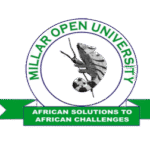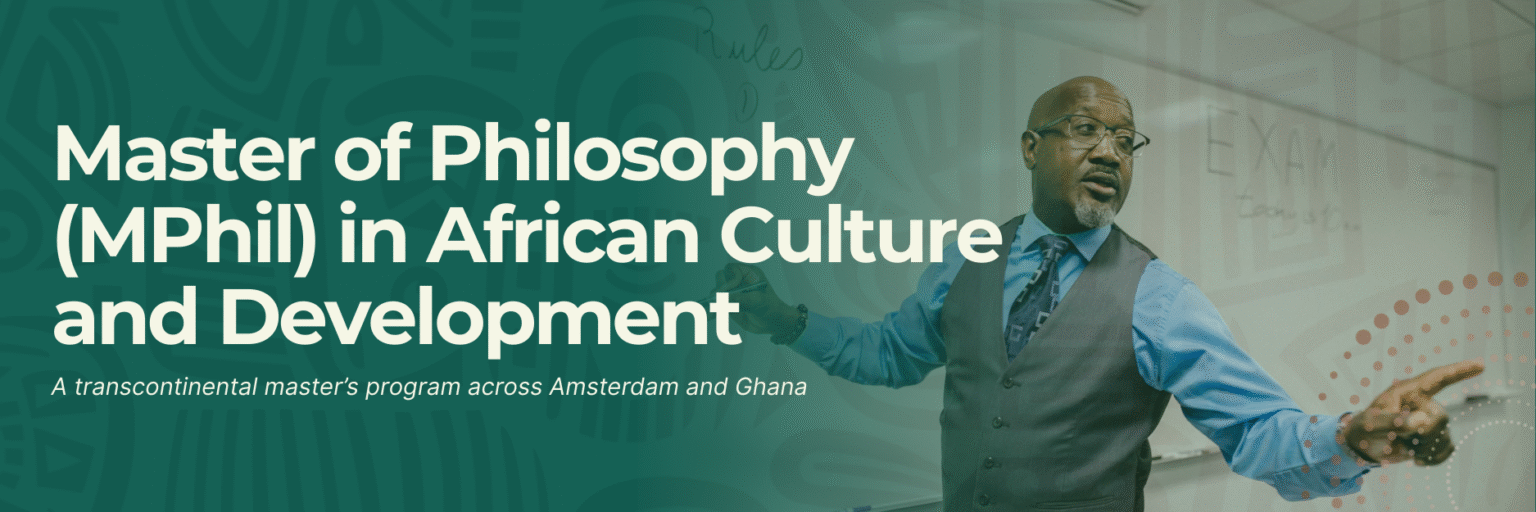In collaboration with

Program Introduction
Start Date: January 2026
The Master of Philosophy (MPhil) in African Culture and Development is a two-year (part-time), cross-continental academic program designed for adult learners eager to challenge dominant knowledge systems and advance culturally grounded development practice.
Whether you are a mid-career professional, early researcher, or lifelong learner, this program provides the intellectual space, supervision, and academic community to deepen your engagement with African-centered development thinking.
- Engage in deep study of African philosophies, indigenous knowledge systems, and decolonial development approaches.
- Participate in immersive learning across the Netherlands and Ghana.
- Contribute to emerging global dialogues on African-centered thought and praxis.
- Contribute to transformative conversations around epistemic justice and Pan-African development.
The MPhil in African Culture and Development provides a distinctively African perspective on development. The program explores how cultural knowledge and practices shape transformations in key areas such as agriculture, health, education, natural resource management, conflict resolution, and social organization.
Students will engage with development as both a theoretical and practical endeavor, combining classroom learning with fieldwork and research in culturally grounded contexts.
This program is best suited for those aiming to apply their learning in academic institutions, NGOs, cultural sectors, or policy environments.
The program is grounded in a decolonial and Pan-African intellectual tradition. Students examine how colonial legacies continue to influence development thinking, while engaging with African philosophies, indigenous knowledge systems, and endogenous models of change.
This framework challenges Eurocentric paradigms and positions culture not as an accessory to development but as a central scientific field of inquiry.
The MPhil is jointly delivered by the Broos Institute (Amsterdam, NL) and the Millar Institute for Transdisciplinary and Development Studies (Bolgatanga, GH).
This partnership offers a unique transcontinental academic experience:
Amsterdam:situating Afrocentric research within European academic debates and institutions.
Ghana: immersive fieldwork and community engagement in African cultural contexts.
By moving between these two learning environments, students gain both the critical distance to challenge Eurocentric frameworks and the cultural grounding to practice endogenous development.
Program Aims & Objectives
This program positions culture as a field of science and promotes evidence-based approaches to development. Learning outcomes are guided by Bloom’s taxonomy, ensuring that students remain at the center of knowledge creation.
The aims are to:
- Foster critical learning that connects cultural knowledge to African development challenges.
- Equip students with advanced research tools to broaden the definition of science to include culture.
- Highlight the relevance of African sciences in global academic and policy debates.
- Develop practical skills for designing culturally grounded strategies in poverty reduction and sustainable development.
- Language of instruction : English
- Mode: Modular part-time, covering six (6) trimesters
- Location : In-person lectures in the Netherlands and Ghana
- Tuition Fee : €9,000 (€4,500 per academic year)
Course delivery
Learning is structured over six trimesters (two years), combining classroom instruction, independent study, and immersive fieldwork. Students begin in Amsterdam and transition to Ghana for field-based learning before undertaking their thesis. Instruction methods include: lectures, research seminars, presentations, field visits, and supervised thesis writing.
Year one
Term 1 (Jan - Mar)
Term 2 (May - Jul)
T3 (Sep-Nov)
Foundational courses and electives (4) in NL
Foundational courses and electives (4) in NL
Field visit, electives (2) term paper in Ghana
Year Two
T4 (Jan-Mar)
T5 (May-Jul)
T6 (Sep-nov)
Research seminars and presentation of term paper
Independent research and thesis development
Thesis submission and oral defense (Viva)
Is This Program Right for You?
-
The MPhil in African Culture and Development is designed for ambitious learners who want to advance their expertise in Afrocentric scholarship and African Studies.
The program particularly suits individuals who:
- Are motivated by Pan-African and decolonial approaches to education.
- Wish to explore how African philosophies, and indigenous knowledge systems shape development.
- Enjoy research, critical reading, and advanced academic writing.
- Seek to conduct original field-based research in both Africa and Europe.
- Aspire to contribute as independent scholars in African Studies and global development debates.
- Have the ambition to become an independent researcher.
- Inspired by what you’ve read? Start your application now.
Admission Requirements
Applicants must hold a bachelor’s degree with at least a second class lower (or Dutch equivalent of 6/10) and strong English skills.
If the prior degree was not taught in English,TOEFL, IELTS, or equivalent proof of proficiency is required.
Requirements for Graduation
To complete the program, students must achieve a total of 61 credit hours (122 ECTS), which include coursework, seminar presentations, a term paper, and a thesis.
Applicants are required to apply to the program via the Broos Institute website and submit the following:
-
An application form
-
Two academic references
-
Proof of linguistic proficiency (if applicable)
Questions about applying? Visit our contact page - our admissions team is here to support you through every step of the enrollment process.
Credit hours vs. ECTS
For international students, it’s helpful to understand how workload is calculated under the Ghanaian university credit system.
At MITDS, one credit hour equals two ECTS, and each ECTS represents about 40 hours of study, including lectures, homework, and preparation.
Assessment Regulations
Students enrolled in the Master’s program must achieve a minimum of 60% in all taught courses. The thesis will be assessed within three months of submission by internal and external examiners, with final performance confirmed by the Graduate Board. Successful candidates are awarded the Master’s degree.
Get the full Master’s curriculum, course modules, tuition fee structure and program details in one place.
The program is delivered in partnership with Ghana’s Millar Institute (MITDS), renowned for Afrocentric research.
Meet the board members and educators guiding the vision of the Broos Institute. Each one brings a wealth of knowledge.

